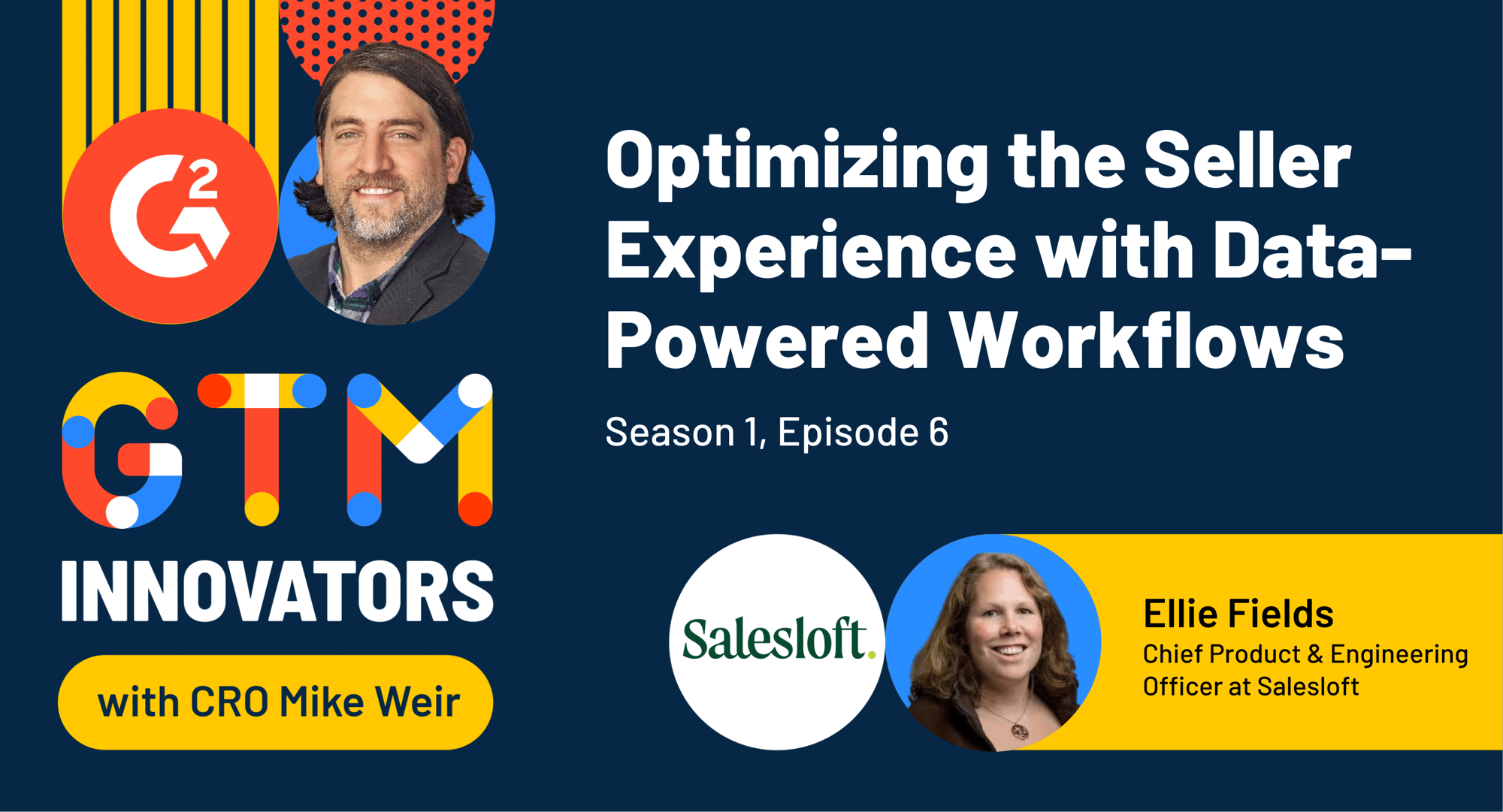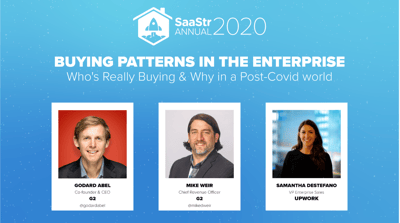June 29, 2023
 by Stephen Hoops / June 29, 2023
by Stephen Hoops / June 29, 2023

Every successful business is quick to praise their best sales team contributors.
Top sales professionals within a revenue organization can reveal a good deal about how others can find success. It’s only natural that we want to examine them to understand what contributes to their process, and then replicate those learnings across the sales team.
Some businesses sometimes put too much stock into these individual performers and do not realize how to alleviate challenges in other ways. What makes sellers better than their colleagues might come down to what makes them unique as a human.
Ellie Fields is the Chief Product & Engineering Officer at Salesloft. Having previously led senior product development, marketing, and management roles at Tableau and Microsoft, she’s a SaaS industry veteran passionate about seeing people grow, products roll out, and watching all the pieces come together.
Ellie Fields joined G2 Chief Revenue Officer Mike Weir for the latest episode of the GTM Innovators podcast to discuss how GTM teams can identify improvements and optimizations that can help sales teams reach new highs. In this episode recap, you’ll learn about Ellie’s perspectives on how reality stifles GTM strategies and how to empower sales teams to do what they do best.
A thoughtful, comprehensive strategy is the culmination of shared experiences and hard work. It attempts to provide context around timelines, anticipated obstacles, and expected results.
Any go-to-market (GTM) strategy stands to encounter numerous variables and challenges. But according to Ellie, reality is the biggest hurdle GTM teams have to overcome.
“Sometimes sales leaders think about this clean, crisp world that they are living in, following this idea of a sales process and buyer journey,” says Ellie. “But when you watch a seller, it's so much more chaotic than that.”
We like to think our planning and processes will save us from chaos. Planning and strategy help us navigate reality, but they’re not foolproof.
Sales leaders can find themselves looking at the buyer’s journey as a rigid process. However, Ellie argues that when you take the time to understand their average day, sellers have increasingly less time to engage and create value for buyers.
When you hire sales professionals, you’re leaning on them to connect with buyers on a human level. According to Ellie, there are some organizations where the data suggests sellers engage with buyers for 25% or less of their day.
Ellie’s key to solving this problem is to examine seller workflows to understand what is and isn’t working. It’s all about addressing and acknowledging the curveballs reality throws your way to bring order to the chaos.
There’s no refuting the value and insights an organization can derive from its data. But data is only significant if it’s also usable, trackable, and visible.
For example, it’s hard to ignore how indispensable customer relationship management (CRM) software has been in B2B sales. It’s become a vital tool that countless revenue organizations rely on throughout the world.
At its core, a CRM is a database-centric solution with a carefully designed user interface. And while it’s difficult to deny these tools' usefulness, Ellie argues that sellers spend big chunks of their day sourcing data from more places than just a CRM.
Ellie Fields
Chief Product & Engineering Officer, Salesloft
Jumping around from one solution to the next to source data can be time-consuming. What’s even more difficult is attempting to analyze the data from these different systems to enact meaningful change to create better workflows for sales teams.
Tracking and understanding this data is important for sales leaders to not only identify their top performers. This effort also aims to comprehend what distinguishes them from their colleagues and which actions drive the best results.
The concept of observability in IT and software refers to the ability to see how certain systems and builds are working. This means seeing errors and comprehending how they impact experience, uptime, and much more. Seeing this kind of information allows teams to understand what is and isn’t working.
Ellie says that sales is often viewed as a more person-to-person endeavor. This means that observability in the sense of making improvements doesn’t happen as often as it should.
By adopting more of an “observable” mindset, she suggests there’s a ton of analysis that organizations can take on to improve the selling experience and find new optimization opportunities. Let’s explore some of Ellie’s key takeaways from this latest podcast episode.
Ellie thinks sales leaders can uncover a goldmine of insights just by examining top sales performers. For the most part, the idea is to gain a complete picture of the average daily experience to see where these sales professionals spend their time.
Ellie Fields
Chief Product & Engineering Officer, Salesloft
Measuring the effectiveness of certain sales activities can yield good insights. However, sales teams may not have optimal workflows that empower them to spend their time wisely.
If a team of salespeople routinely gets bogged down with administrative tasks, revenue organizations should see this as an opportunity to figure out where automation can help. It can also signal that it’s the right time to explore new solutions that optimize their daily workflows.
“I don't care about what data we use or what technology we use,” says Ellie. “I want to make sure that the human is served in the jobs they are trying to do.”
A big talking point Ellie emphasizes throughout the podcast is that salespeople are humans, which is why they were hired in the first place. Their goal is to progress business and create joint value for themselves and the buyer, which roadblocks can drastically hinder in their workflows.
One thing you’ll often hear in revenue organizations is the desire to take top performers and repeat their success across the sales team. While this is easier said than done, Ellie says to keep a lookout for success factors that are replicable beyond the human qualities that sets these sellers apart from their peers.
“If they're a personable gal from Minnesota, not everyone's gonna be able to be a personable gal from Minnesota,” says Ellie. “But if that personable gal has a killer talk track on your competitive space, your product value, or whatever it is, people can study that.”
Ellie is known for stressing the importance of what we bring to the table as humans. Sales professionals are often positive-minded individuals who want to make things work to provide mutual value.
When sellers have to spend more time on low-value tasks and less interacting with buyers and customers, something needs to change. By evaluating the benefits of workflow-centric thinking, Ellie thinks revenue organizations can empower their sales teams to focus on what they do best.
In episode 6 of GTM Innovators, the full conversation with Ellie Fields includes other takeaways such as:
Watch the full episode on YouTube and learn more about Ellie and other GTM experts by subscribing to the GTM Innovators podcast today - available on Spotify, Apple Podcasts, iHeartRadio, Amazon Music, and more.
Stephen Hoops is a former Sr. Content Marketing Specialist at G2. He focused on creating content that helps tech industry sales professionals and B2B SaaS marketers find success with G2 products such as Buyer Intent, Review Generation, and more. After receiving his B.A. in Journalism from West Virginia University in 2013, he has helped countless B2B brands reach new highs through content creation and SEO. When not nerding out about the artistry behind well-written copy, Stephen can be found info-dumping about homemade cocktails, Italian cuisine, and why vinyl is the superior physical medium for music.
Pinching pennies is the norm during the seemingly everlasting COVID-19 pandemic.
 by Mary Clare Novak
by Mary Clare Novak
Every industry has jargon. Real estate is no different.
 by Izabelle Hundrev
by Izabelle Hundrev
No matter what it is that you’re shopping for, it’s always exciting when you get a discount on...
 by Izabelle Hundrev
by Izabelle Hundrev
Pinching pennies is the norm during the seemingly everlasting COVID-19 pandemic.
 by Mary Clare Novak
by Mary Clare Novak
Every industry has jargon. Real estate is no different.
 by Izabelle Hundrev
by Izabelle Hundrev


